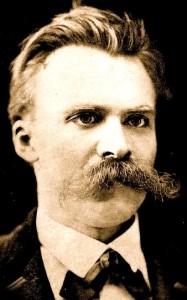 When Nietzsche was a boy he was called “the little pastor”. His father was a Lutheran preacher. He expected to be a clergyman like his father, but at university he began to question his upbringing. He became a professor at the age of 24. He decided that Christianity robbed people of the will to excel. His ideal was the artistic warrior hero of ancient Greek. In his eyes, people were not created equal. There were men, and there were supermen. Nietzsche’s “superman” combined strength, intellect, and creativity.Nietzsche thought that these “higher” beings were the key to future. He thought the Christian era had had its day. That was the message behind his statement: God is dead.
When Nietzsche was a boy he was called “the little pastor”. His father was a Lutheran preacher. He expected to be a clergyman like his father, but at university he began to question his upbringing. He became a professor at the age of 24. He decided that Christianity robbed people of the will to excel. His ideal was the artistic warrior hero of ancient Greek. In his eyes, people were not created equal. There were men, and there were supermen. Nietzsche’s “superman” combined strength, intellect, and creativity.Nietzsche thought that these “higher” beings were the key to future. He thought the Christian era had had its day. That was the message behind his statement: God is dead.
Nietzsche blamed cultural decay on the belief that being poor and submissive was good, but being rich and masterful was wicked. His studies taught him that different societies prized different values.He said Plato had started the rot by coming up with the idea of another reality behind this one . Fear of eternal hell made people repress their natural passions , abilities and differences. Nietzsche preferred the idea of “eternal recurrence”, meaning that this life is the only reality, but it will be repeated forever. He dropped out of society and lived in the Alps for ten years.
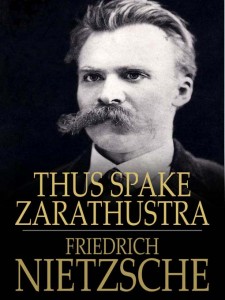 He urged people to live life as a work of art. Nietzsche’s “superman” was a lover of life and would welcome the chance to repeat it in every detail. Nietzsche’s name is tainted by those who took his ideas and used them for their own ends. His writing style left his work open to interpretation by lunatic fringe groups. The main theme of his books is that individuals should try to achieve their full potential. His most popular book is “Thus Spoke Zarathustra”.
He urged people to live life as a work of art. Nietzsche’s “superman” was a lover of life and would welcome the chance to repeat it in every detail. Nietzsche’s name is tainted by those who took his ideas and used them for their own ends. His writing style left his work open to interpretation by lunatic fringe groups. The main theme of his books is that individuals should try to achieve their full potential. His most popular book is “Thus Spoke Zarathustra”.
Nietzsche’s own life was dogged by illness, first physical, then mental. For the last ten years of his life he was went insane and spent his last years in the care of his sister, who edited his work to fit in with her own narrow views. Years after Nietzsche’s death. she saw Hitler as the prototype “superman”. History tells the rest.
NIETZSCHE AND PERSIA
Nietzsche and Persia before Islam: Nietzsche’s studies of classical philology and his deep impression in Greek and Latin literature also introduced him to the ancient history of Persia and its culture, conceived as an Asiatic culture embodied in an imperial power in contradistinction to the Greek city-state in the neighbourhood.
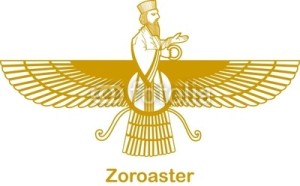 Nietzsche’s concern with Persia is well reflected in his choice of “Zarathustra” as the prophet of his philosophy and the eponymous hero of his most popular work “Thus Spoke Zarathustra”. He singles out for praise of Persian people of ancient times and their culture, their mastery of archery and horsemanship, their war like imperiousness, and their emphasis on the virtue of truthfulness. He says: “I must pay tribute to Zarathustra, a Persian; Persian were the first to have conceived of history in its full extent.”
Nietzsche’s concern with Persia is well reflected in his choice of “Zarathustra” as the prophet of his philosophy and the eponymous hero of his most popular work “Thus Spoke Zarathustra”. He singles out for praise of Persian people of ancient times and their culture, their mastery of archery and horsemanship, their war like imperiousness, and their emphasis on the virtue of truthfulness. He says: “I must pay tribute to Zarathustra, a Persian; Persian were the first to have conceived of history in its full extent.”
In a posthumously published fragment, he deplores a lost opportunity: “It would have been much more fortunate had the Persian become masters of Greeks, rather than have the Romans of all people assume the role”. In this note, Nietzsche implicitly expresses once more his radical opposition to Greek metaphysical thought, as developed by Socrates and Plato, and its later prevalence in Western World through the supremacy of Greek culture within the Roman empire.
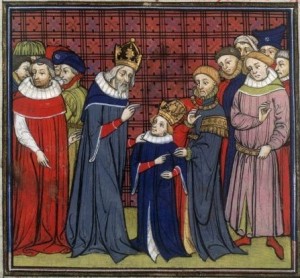 This process ultimately led, at the hands of Church Fathers, to the integration of the Platonic metaphysics, as developed in Rome by the Neoplatonists, within the theological doctrines of Christianity. Nietzsche considered this whole historical development as constituting an ascetic and nihilistic world view that denied and reviled the reality of this-worldly existence in the name of an illusory, eternal, and other-worldly life. Therefore, he thought that if the Persian rather than the Romans had been successful in gaining dominance over Greece, the predominance of their positive outlook towards worldly life and time would have prevented such a lamentable in human history.
This process ultimately led, at the hands of Church Fathers, to the integration of the Platonic metaphysics, as developed in Rome by the Neoplatonists, within the theological doctrines of Christianity. Nietzsche considered this whole historical development as constituting an ascetic and nihilistic world view that denied and reviled the reality of this-worldly existence in the name of an illusory, eternal, and other-worldly life. Therefore, he thought that if the Persian rather than the Romans had been successful in gaining dominance over Greece, the predominance of their positive outlook towards worldly life and time would have prevented such a lamentable in human history.
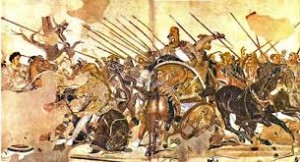 He speaks with great admiration of Zoroaster and his religion and impresses his sympathy for historically not improbable possibility that Zoroastrianism could have well triumphed in ancient Greece: “Zoroaster’s religion would have prevailed in Greece, if Darius had not been defeated. Also in his posthumously work, he refers to the probable influence of Zoroaster in Heraclitus.
He speaks with great admiration of Zoroaster and his religion and impresses his sympathy for historically not improbable possibility that Zoroastrianism could have well triumphed in ancient Greece: “Zoroaster’s religion would have prevailed in Greece, if Darius had not been defeated. Also in his posthumously work, he refers to the probable influence of Zoroaster in Heraclitus.
One may wonder why Nietzsche abandoned the familiar name of Zoroaster for the Original Old Persian form of it , Zarathustra, at a time when only specialists in Indo-Iranian philology were familiar with the original form. As Nietzsche admits himself, by choosing the name of Zarathustra as the prophet of his philosophy in a poetical Idiom, he wanted to pay homage to the original Aryan prophet as a prominent founding figure of the spiritual-moral phase in human history, and reverse his teaching at the same time, according to his fundamental critical views on morality.
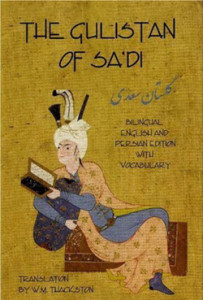 Nietzsche and Persia after Islam: Nietzsche shows no practical interest in Persian history after the rise of Islam, though he does make occasional allusions to Moslems. Among the prominent figures of Persian history from the Islamic era the name of poet Sa’di is mentioned once in his notebooks, while there are several references to Hafez. They are the only Persian names of the Islamic era mentioned in Nietzsche’s writings.
Nietzsche and Persia after Islam: Nietzsche shows no practical interest in Persian history after the rise of Islam, though he does make occasional allusions to Moslems. Among the prominent figures of Persian history from the Islamic era the name of poet Sa’di is mentioned once in his notebooks, while there are several references to Hafez. They are the only Persian names of the Islamic era mentioned in Nietzsche’s writings.
Nietzsche and Sa’di: In Nietzsche’s notebook there is an anecdote from Sa’di which originally belongs to the preface of his Rose Garden (Golestan). The anecdote, according to his citation, says: “from whom did you learn that much?” asks Sa’di from wise man. and receives the reply: “from the blind who never put a foot forward without first examining the ground with their sticks,” (The “wise man” in the preface to the Rose Garden, is Loqman, a legendary figure and purveyor of wise aphorisms in Persian and Arabic literature.)
 Nietzsche and Hafez: Hafez, however, provides Nietzsche with a prime example of example of “Dionysian” ecstatic wisdom, which he extols so extensively in his writings. there are several references to the poet in Nietzsche’s works. Obviously Goethe’s admiration for Hafez and his “Oriental” wisdom, has been the main source of attracting Nietzsche to the Persian poet. The name of Hafez, usually in association with Goethe, appears about ten times in his writings. He admires both poets for reaching the zenith of joyful human wisdom. For him Hafez exemplifies the Oriental free spirit who gratefully receives both the pleasure and sufferings of life. Nietzsche commends such an attitude as sign of a positive and courageous valuation of life.
Nietzsche and Hafez: Hafez, however, provides Nietzsche with a prime example of example of “Dionysian” ecstatic wisdom, which he extols so extensively in his writings. there are several references to the poet in Nietzsche’s works. Obviously Goethe’s admiration for Hafez and his “Oriental” wisdom, has been the main source of attracting Nietzsche to the Persian poet. The name of Hafez, usually in association with Goethe, appears about ten times in his writings. He admires both poets for reaching the zenith of joyful human wisdom. For him Hafez exemplifies the Oriental free spirit who gratefully receives both the pleasure and sufferings of life. Nietzsche commends such an attitude as sign of a positive and courageous valuation of life.
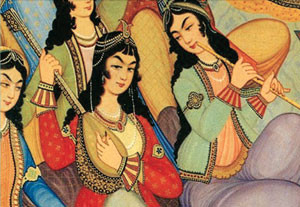 There is even a short poem in Nietzsche’s collected works, entitled “To Hafez: Question from a Water Drinker.” The poem celebrates the insightfulness of Hafez and his poetical achievements. At the end, he asks Hafez, as a “water drinker,” why he demands wine while he himself has the power of making everybody intoxicated. It must be remembered that, for health reasons, Nietzsche himself was apparently a lifelong abstainer. He considered “alcohol and Christianity” as the two harmful narcotics for the European soul.
There is even a short poem in Nietzsche’s collected works, entitled “To Hafez: Question from a Water Drinker.” The poem celebrates the insightfulness of Hafez and his poetical achievements. At the end, he asks Hafez, as a “water drinker,” why he demands wine while he himself has the power of making everybody intoxicated. It must be remembered that, for health reasons, Nietzsche himself was apparently a lifelong abstainer. He considered “alcohol and Christianity” as the two harmful narcotics for the European soul.